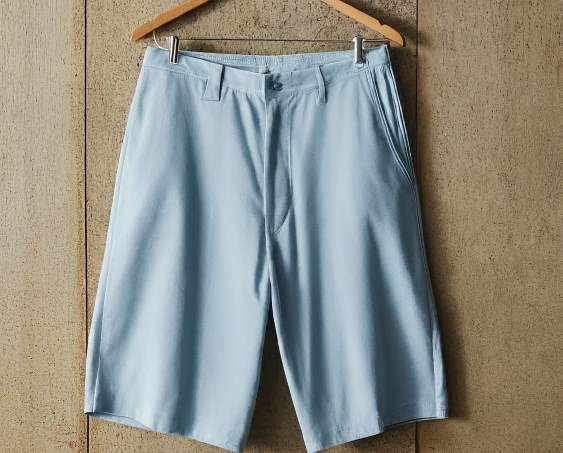Cotton and the Pool: A Not-So-Perfect Match
Taking a dip in the pool on a hot day can be incredibly refreshing. But before you grab that old cotton t-shirt or wear your favorite pair of cotton shorts, there’s something important to consider: is cotton suitable for swimming? The short answer? No, cotton is not the ideal fabric for pool use. Here’s why:
Why Cotton Doesn’t Belong in the Pool
Cotton may seem like a comfortable choice for the pool, but its properties make it a less than ideal option. Here are several reasons why cotton should be left on the pool deck:
-
Absorption Nightmare: Cotton is a highly absorbent material. This means it will soak up pool water like a sponge, becoming heavy, uncomfortable, and restricting your movement while swimming. Imagine trying to swim while dragging a waterlogged t-shirt behind you. Not exactly an enjoyable experience.
-
Slows You Down: The weight of the absorbed water can significantly hinder your swimming ability. Cotton clothing creates drag, making it harder to move through the water and potentially leading to fatigue. For competitive swimmers or those who enjoy a good workout in the pool, cotton can be a major obstacle.
-
Drying Dilemma: Unlike synthetic fabrics that dry quickly, cotton takes a long time to air dry, especially when soaked. This can lead to a feeling of dampness and discomfort, and also increases the risk of developing a rash or irritation from prolonged exposure to wet clothing.
-
Chemical Concerns: Chlorine, a common disinfectant used in most pools, can react negatively with cotton fibers over time. This can cause the cotton to weaken, fade, and lose its shape. Additionally, some cotton clothing may contain dyes or finishes that can bleed into the pool water when exposed to chlorine.
-
Hygiene Hazards: Cotton clothing can trap sweat, sunscreen, and other body fluids, which can contribute to the growth of bacteria and germs in the pool water. This can be particularly problematic in public pools where many people are sharing the same water.
-
Pool Regulations: Some public pools may have regulations against wearing cotton clothing. This is done to maintain water quality and hygiene standards. It’s always best to check the pool’s rules before heading out for a swim.
Swimsuit Fabrics: Making the Right Choice
Now that you know why cotton isn’t the best pool attire, let’s explore some better options:
-
Synthetics Rule: Synthetic fabrics like polyester, nylon, and Lycra are the best choices for swimming. These materials are designed to be water-resistant, lightweight, and quick-drying. They allow for unrestricted movement in the water, dry quickly after swimming, and resist chlorine damage.
-
Look for Swimsuit Materials: When shopping for swimwear, look for labels that mention “chlorine resistant” or “pool suitable” fabrics. These suits are typically made from a blend of synthetic materials that are specifically designed for pool use.
-
Consider Mesh Panels: Some swimsuits incorporate mesh panels for added ventilation and breathability. This can be particularly beneficial for hot-weather swimming, as it allows for better air circulation and helps keep you cool.
-
Fit Matters: A well-fitting swimsuit will be comfortable, provide adequate coverage, and allow for freedom of movement. Avoid swimsuits that are too loose or too tight, as these can be restrictive and uncomfortable while swimming.
Alternatives to Cotton for the Pool
While cotton may not be ideal for swimming, there are a few other options to consider if you’re looking for something different from traditional synthetic swimsuits:
-
Microfiber: Microfiber is a type of synthetic fabric known for its exceptional moisture-wicking properties. It absorbs a small amount of water but quickly transfers it away from the body, keeping you feeling dry and comfortable. Microfiber can also be quite soft and lightweight, making it a good choice for those who find traditional swimsuits too revealing.
-
Recycled Materials: Many swimwear brands are now offering eco-friendly options made from recycled materials like plastic bottles or fishing nets. These suits offer the same benefits of traditional synthetics (chlorine resistance, quick-drying) with the added benefit of sustainability.
-
Rashguards: Rashguards are tight-fitting shirts made from synthetic fabrics like Lycra or spandex. They offer sun protection (UPF rating) and can be a good option for activities like surfing, paddleboarding, or spending extended periods in the sun by the pool. However, rashguards typically don’t offer the same level of coverage as a traditional swimsuit.
-
Wetsuits: Although not for everyone, wetsuits are another option for those who need warmth while swimming in colder water. Wetsuits are made from neoprene, a synthetic rubber material that provides insulation and helps retain body heat. However, wetsuits can be quite restrictive and can take some getting used to.
Additional Considerations for Poolside Comfort
Beyond choosing the right fabric for your swimsuit, there are a few other things to consider for a comfortable time at the pool:
-
Cover-ups: Having a light cover-up like a sarong or a beach towel is essential. This will allow you to change in and out of your swimsuit discreetly and provide protection from the sun when you’re not in the water.
-
Pool Shoes: Pool decks can become hot and slippery, especially on sunny days. Wearing pool shoes can help prevent slipping and protect your feet from hot pavement.
-
Sunscreen: Sun protection is crucial even when swimming. Apply a broad-spectrum sunscreen with SPF 30 or higher before heading to the pool, and reapply frequently, especially after swimming or sweating.
Conclusion
While that old cotton t-shirt may seem like a convenient option for a quick dip, your swimming experience will be much more enjoyable with proper swimwear.
By choosing synthetic fabrics that are designed for pool use, you can ensure comfort, ease of movement, and quick drying times. So, ditch the cotton and embrace the world of pool-friendly swimwear for a refreshing and hassle-free swim!
